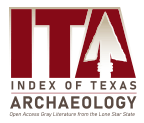Home > Research Projects and Centers > Center for Regional Heritage Research > Index of Texas Archaeology > Vol.
Article Title
Agency
Texas Historical Commission
Abstract
In March 2020, an intensive archeological survey was completed in order to inventory and evaluate archeological resources within the proposed footprint of a new Center for the Arts, Performing Arts, and Conference Center in Aransas County, Texas.
The project is owned and sponsored by the Rockport Center for the Arts. The project area lies adjacent to the Kline’s Café Building, which has been determined eligible for inclusion on the National Register of Historic Places (NRHP). Under the current preferred alternative, the Kline Café will be relocated to a location outside of the project area. This action is considered “an adverse effect” and triggers a review under Section 106 of the National Historic Preservation Act, as amended. The project has an additional federal nexus since it will be undertaken using federal funds from the Economic Development Administration. The project will include the lease of approximately 0.22 acres of City of Rockport-owned right-of-way along E. North Street. As a result, the project is also subject to the Texas Antiquities Code. Texas Antiquities Permit #9305 was assigned to this project by the Texas Historical Commission.
The project area was subjected to an intensive pedestrian survey augmented with the excavation of shovel test units. The survey was carried out by Scotty Moore (Principal Investigator) and Austin Blase of Cox|McLain Environmental Consulting, Inc. on March 6, 2020. Shovel test unit placement was determined based on ground surface visibility, the presence of soils having sufficient depth and integrity to contain intact subsurface cultural materials, and previous disturbances encountered. In all, 9 shovel test units were excavated across the APE in areas that lacked clear evidence of significant ground disturbance or impenetrable surfaces (e.g., asphalt pads, concrete foundations).
Pedestrian survey revealed that the entire approximately 1.0-acre (0.4 hectare) archeological area of potential effects (APE) has been subjected to significant anthropogenic alteration associated with more than a century of low-density urban development. It has been further disturbed by the impacts of storm surges and flood events associated with high-energy events such as Hurricane Harvey. Survey revealed the remnants of two historic-age foundations within the southern half of the APE that were associated with an approximately 40-centimeter-thick (15.8-inch-thick) mixed deposit of historic-age debris consisting of glass, metal, ceramic, and dietary faunal bone. Collectively, these deposits and features have been designated a new archeological site: 41AR120. Due to the impacts of multiple and substantial disturbance events, the cultural materials associated with this site lack integrity of association and are recommended as ineligible for inclusion on the National Register of Historic Places. Due to the mixed nature of subsurface deposits, the research potential for this site is low. As a result, no further archeological work within this project area is recommended.
The historic-age Kline Café is surrounded by extensively disturbed sediments that lack evidence of intact buried cultural resources deposits. The potential for buried resources underneath the building is considered low. Since the resource will be moved off-site and preserved, no further archeological work is recommended. The Texas Historical Commission concurred with this decision on April 8, 2020.
Creative Commons License

This work is licensed under a Creative Commons Attribution-NonCommercial 4.0 International License
Included in
American Material Culture Commons, Archaeological Anthropology Commons, Environmental Studies Commons, Other American Studies Commons, Other Arts and Humanities Commons, Other History of Art, Architecture, and Archaeology Commons, United States History Commons
Submission Location
Tell us how this article helped you.


